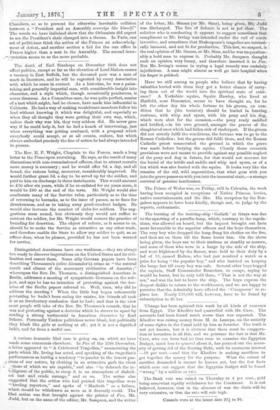A curious dramatic libel case is going on, on which
we have made some comments elsewhere. In Fun of the 25th December, a letter appeared to " A Celebrated Tragedian-," enumerating the parts which Mr. Irving has acted, and speaking of the tragedian's performances as havilig a tendency " to pander to the lowest pas- ., sions of our nature, by clothing in an attractive garb the vilest ^lions of which we are capable," and also "to debauch the in- telligence of the public, to steep it in an atmosphere of diaboli- cal lust and crude carnage," and so on. The writer also suggested that the critics who had praised this tragedian were " hireling reporters," and spoke of " Macbeth " as a failure, which should be withdrawn as soon as it decently could. The libel action was first brought against the printer of Fun, Mr. Judd, but on the name of the editor, Mr. Sampson, and the writer
of the letter, Mr. Simms (or Mr. Sims), being given, Mr. Judd was discharged. The line of defence is not as yet clear. The solicitor who is conducting it appears to suggest sometimes that compliment to Mr. Irving was intended under the veil of comic invective, and sometimes that Shakespeare's tragedies are intrinsi- cally immoral, and not fit for production. This last, we suspect, is the realopinion of Mr. Simms, or Mr. Sims, and lie was unquestion- ably a bold man to express it. Probably Mr. Sampson thought such an opinion very funny, and therefore inserted it in Fun. But Mr. Irving's course in trying a legal remedy was certainly injudicious. A man might almost as well go into hospital when his finger is pricked.










































 Previous page
Previous page